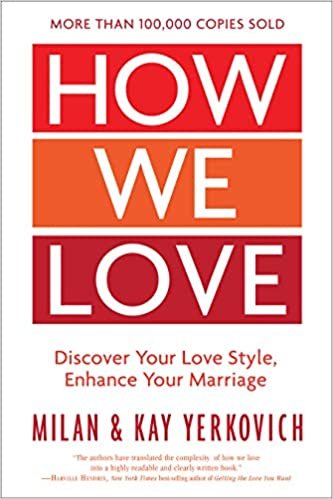How We Love: Discover Your Love Style, Enhance Your Marriage

Physical Copy:
Audiobook:
By: Milan and Kay Yerkovich
Rating: A-
This book came highly recommended from a friend as a great tool to work on yourself as a spouse. The authors describe 6 love styles and how they all interact with each other. They go through how they interact in healthy and unhealthy ways and what to do about it. I felt like they were looking deep into my soul.
The Six Love Styles:
- The Avoider: Avoiders come from homes that are often low in affection, but place high value on independence and self-reliance. Avoiders grow up learning to take care of themselves. To deal with the anxiety of having so little comfort and nurturing from their parents, they have learned to restrict their feelings and suppress their needs. As adults, Avoiders can seem emotionally distant or unengaged.
- The Pleaser: Pleasers usually grow up in homes with an overly protective or angry, critical parent. Pleaser children do everything they can to “be good” and avoid troubling their reactive or anxious parents. These kids don’t get comfort. Rather, they spend their energy comforting, caretaking, and appeasing parents and siblings. As adults, Pleasers tend to continually monitor the moods of others around them and try to keep everyone happy. Eventually, they can become resentful but rarely know how to express their own difficult emotions or ask for what they want.
- The Vacillator: Growing up with an unpredictable parent, Vacillators’ needs aren’t top priority. Without consistent parental affection and attention, they develop feelings of abandonment. By the time the parent feels like giving again, their child is tired of waiting and too angry to receive. As adults, Vacillators are on a quest to find the consistent love they never received as children. They idealize relationships, hoping to avoid any feelings of rejection or abandonment. Life isn’t ideal and as a result they often feel disappointed, angry and let down.
- The Controller: Controllers need control to keep the vulnerable, painful feelings they experienced during childhood from surfacing in their adult lives. Having control means having protection from the overwhelming feelings of fear, humiliation and helplessness they had to endure as kids. Anger is the one emotion that is not vulnerable, so intimidation and anger are often used to stay in charge. Control may be highly rigid or more sporadic and unpredictable, but Controllers rarely realize the real reason they need to be in charge. They rarely have compassion for themselves as to the suffering they endured as children and therefore minimize the impact of their childhood trauma and its effects on their adult relationships.
- The Victim: In chaotic homes, compliant kids survive by trying to stay under the radar. They hide, appease and learn to tolerate the intolerable. At times they may disconnect (not be fully present) in order to lessen the pain caused by their neglectful, angry, chaotic parent(s). Some kids build whole imaginary worlds in their heads where they can escape the pain of abuse. As adults, Victims lack a sense of self-worth and are often anxious, depressed and just going through the motions. They may replicate their childhood home environment by marrying a Controller and using the same coping methods they learned as kids (compliance and retreat) to get along.
- The Secure Connector: Secure Connectors are comfortable with reciprocity and balanced giving and receiving in relationships. They can describe strengths and weaknesses in themselves and others without idealizing or devaluing. Good at self-reflection, Secure Connectors clearly and easily communicate their feelings and needs. Resolving conflict was modeled for them growing up, so they know they’re not perfect and can apologize when wrong. Setting boundaries and saying “no'' is also no problem for a Secure Connector. They are comfortable with new situations, can take risks, and delay gratification. When upset, Secure Connectors seek help and comfort from a person rather than a thing.
Love Style Quiz
Here is a link to the quiz to determine your love style: https://howwelove.com/love-style-quiz/
My Results
I am hardcore avoider.
This led to some fun and productive conversations with my wife.
Recommended.
